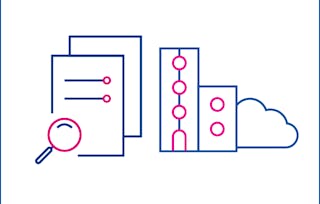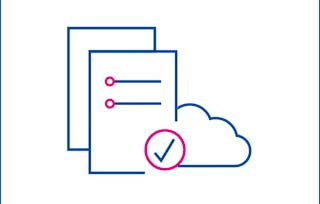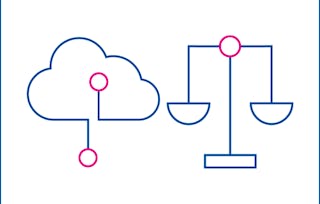Vast amounts of personal information are processed in the cloud. But who is legally responsible for such ‘personal data’ in cloud environments? What duties do cloud providers like Amazon, Microsoft, and Google have? And what rights can you, as an individual, exercise under data protection law? If you’d like to find out, then this course is for you!

Cloud Computing Law: Data Protection and Cybersecurity

Cloud Computing Law: Data Protection and Cybersecurity
This course is part of Cloud Computing Law Specialization



Instructors: Christopher Millard
4,916 already enrolled
Included with
76 reviews
Recommended experience
Skills you'll gain
- Cloud Computing
- Information Privacy
- Cloud Services
- Data Security
- Data Governance
- Regulatory Requirements
- Personally Identifiable Information
- General Data Protection Regulation (GDPR)
- Risk Management Framework
- Cybersecurity
- Cloud Security
- Law, Regulation, and Compliance
- Skills section collapsed. Showing 8 of 12 skills.
Details to know

Add to your LinkedIn profile
11 assignments
See how employees at top companies are mastering in-demand skills

Build your subject-matter expertise
- Learn new concepts from industry experts
- Gain a foundational understanding of a subject or tool
- Develop job-relevant skills with hands-on projects
- Earn a shareable career certificate

There are 3 modules in this course
This week, you'll learn how data protection laws regulate the processing of personal data in cloud services. We will focus, in particular, on the rules applying to cloud service providers and their customers as 'processors' and 'controllers' under the EU's General Data Protection Regulation (GDPR). We will explore the principles that must be followed and consider the legal grounds for processing personal data in the cloud, as well as how individuals might exercise their rights and the potential consequences for cloud providers of failing to comply with their obligations. By the end of this week, you'll be able to identify what is regulated as personal data and analyse what cloud providers and their customers must do to ensure compliance with the GDPR.
What's included
10 videos12 readings3 assignments3 discussion prompts
This week, you'll learn how the GDPR applies to international transfers of data in cloud computing. First, we will examine the broad territorial scope of the GDPR in the context of cloud computing. Then we will explore how GDPR may restrict international transfers of cloud data; the legal mechanisms that may be relied on to justify regulated transfers; and possible exceptions to the transfer restriction. By the end of this week, you'll be able to explain the international reach of GDPR and how its data transfer rules apply to cloud providers and their customers.
What's included
10 videos8 readings5 assignments1 discussion prompt
This week, you'll learn about the regulation of cloud services as critical infrastructure under the Network and Information Security ('NIS') Directive. First, we'll look which cloud services need to comply with this Directive. Then, we'll review the obligations to keep cloud services secure and to report security incidents to a regulator. By the end of this week, you'll be able to describe how a cloud provider can comply with the NIS Directive, as well as the possible penalties for breaking the rules.
What's included
7 videos9 readings3 assignments2 discussion prompts
Earn a career certificate
Add this credential to your LinkedIn profile, resume, or CV. Share it on social media and in your performance review.
Instructors

Offered by
Explore more from Law
 Status: Free Trial
Status: Free TrialQueen Mary University of London
 Status: Free Trial
Status: Free TrialQueen Mary University of London
 Status: Free Trial
Status: Free TrialQueen Mary University of London
 Status: Free Trial
Status: Free Trial
Why people choose Coursera for their career

Felipe M.

Jennifer J.

Larry W.

Chaitanya A.
Learner reviews
- 5 stars
89.47%
- 4 stars
9.21%
- 3 stars
1.31%
- 2 stars
0%
- 1 star
0%
Showing 3 of 76
Reviewed on Dec 27, 2023
Wonderful Course! Would definitely recommend to learn on cloud computing.
Reviewed on Sep 1, 2023
Really informative training. Great for GDPR and NIS. While it is all NIS1, it does highlight at the end the nuances with NIS2
Reviewed on Mar 24, 2023
A 5 star course. For introduction level.Has everything it promises, could be more detailed and harder, also longer... but it is insightful overall.

Open new doors with Coursera Plus
Unlimited access to 10,000+ world-class courses, hands-on projects, and job-ready certificate programs - all included in your subscription
Advance your career with an online degree
Earn a degree from world-class universities - 100% online
Join over 3,400 global companies that choose Coursera for Business
Upskill your employees to excel in the digital economy
Frequently asked questions
To access the course materials, assignments and to earn a Certificate, you will need to purchase the Certificate experience when you enroll in a course. You can try a Free Trial instead, or apply for Financial Aid. The course may offer 'Full Course, No Certificate' instead. This option lets you see all course materials, submit required assessments, and get a final grade. This also means that you will not be able to purchase a Certificate experience.
When you enroll in the course, you get access to all of the courses in the Specialization, and you earn a certificate when you complete the work. Your electronic Certificate will be added to your Accomplishments page - from there, you can print your Certificate or add it to your LinkedIn profile.
Yes. In select learning programs, you can apply for financial aid or a scholarship if you can’t afford the enrollment fee. If fin aid or scholarship is available for your learning program selection, you’ll find a link to apply on the description page.
More questions
Financial aid available,


